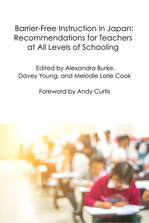Barrier-Free Instruction in Japan: Recommendations for Teachers at All Levels of Schooling
Edited by Alexandra Burke, Davey Young, and Melodie Lorie Cook (Life and Education in Japan Series)
[ Apple | ePub | Everand | Google Play | Kindle | Libby/Overdrive | PDF | Perlego | Print | Proquest | Audiobook]
Thank you to everyone who attended the book launch event in Tokyo and online. See event photos here!

While English language learners with disabilities, especially those with specific learning difficulties (SpLDs) such as Dyslexia, Attention Deficit Hyperactivity Disorder (ADHD) and Autism Spectrum Disorder (ASD), may encounter barriers to their learning, few English language teachers (ELTs) are capable and confident in their ability to provide barrier-free learning environments. This book gives a general background on inclusive education internationally and in Japan and provides case studies of successful accommodations for language learners with disabilities in English language education.
The book is essential reading for language teachers at all levels of education in Japan and parents of language learners with disabilities. In addition, it is an excellent resource for language teachers based in other countries who are interested in providing inclusive and supportive language education.
The book is essential reading for language teachers at all levels of education in Japan and parents of language learners with disabilities. In addition, it is an excellent resource for language teachers based in other countries who are interested in providing inclusive and supportive language education.
Open Access Content: Resources, tables and appendices
Contents
- Foreword: Academic Rigour Meets Writing From the Heart Andy Curtis
- Introduction to the Volume Alexandra Burke, Davey Young, and Melodie Lorie Cook
- Chapter 1: The Emergence and Development of Inclusive Education in Japan: Local to Global and Back Again. Davey Young
- Chapter 2: Learning Differences and Barriers to Language Learning. Alexandra Burke
- Chapter 3: Conceptualizing Inclusive Practices for English Language Teachers. Davey Young and Alexandra Burke
- Chapter 4: Reducing Barriers for Japanese University Students With Learning Difficulties. Sandra Healy and Tomoko Takei
- Chapter 5: Empowering and Enabling Tertiary English Language Learners Towards Equity and Justice for All: A Case Study. Ayako Ooiwa and Michael Yap
- Chapter 6: Supporting EFL Learners With Learning Differences. Olivia Kennedy
- Chapter 7: Nothing About Us Without Us: Creating a Barrier-Free and Inclusive Teaching Environment for Students, Faculty, and Staff With Diverse Abilities. Fiona Creaser and Naomi Yukimaru
- Chapter 8: The Social Accomplishment of the Right to an Education: Interviews With People Who are Blind in Japan. James Carpenter
- Chapter 9: A Student With Visual Impairment in an EFL Reading Classroom: The Teacher and the Student’s Experience. Mizuka Tsukamoto
- Chapter 10: Colorblind Learners: A Social Model of Color Blindness in Language Learning. Ryota Moriya
- Chapter 11: Time to Care: Teaching Discussion to a Hearing-Impaired Student. Kio Iwai
- Chapter 12: Barriers, Accommodations, and Outcomes: Supporting a Neurodiverse Student in Japanese Higher Education. Jennifer Yphantides
- Chapter 13: Dyslexia in Japanese Schooling: An Interview With Eiko Todo. Eiko Todo and Davey Young
- Chapter 14: Incorporating the Needs of Undiagnosed 2e Students Into an English Communication Program for High-Performing Junior High School Students. Hugh Graham-Marr
- Chapter 15: A Father's Journey: Teaching Canadian Inclusive Education in a Japanese Elementary School Special Support Education Classroom. Theodore Bonnah
- Chapter 16: Inclusive Approaches at an After-School Day Service. Hidayat Polim and Johnathan Eckstein
- Chapter 17: Fostering Access to a Japanese School for Children With Filipino Backgrounds. Megumi Yoshieda
- Chapter 18: Conclusion: Takeaways for All Teachers. Melodie Lorie Cook
- Additional Resources
About the editors
Alexandra Burke is a part-time Lecturer at Gifu Shotoku Gakuen University, and the University of Shiga Prefecture. Her research field is how people with neurodiversity encounter and can overcome barriers at all life stages. She was born into a multi-generational neurodiverse family and has chosen to be open about her educational journey to allow others to feel more comfortable exploring what is a "taboo" topic to many. Burke has worked extensively in the classroom setting supporting teachers and learners to change practice methods that will unlock the potential of this group. She has received multiple "Michele Steele Best of JALT Awards" for Chapter presentations and also Best Poster Awards at JALT international and Online Conferences. Her goal is that any person with neurodiversity will have access to a welcoming educational environment and the assistive technology they need to thrive in society.
Davey Young is a Lecturer in the Department of English Studies at Sophia University. He began his career in education working with at-risk student populations in Seattle public schools, including providing language support for immigrant and refugee students. This experience led to his commitment to furthering education as a human right for all people. He holds an MA TESOL from Seattle Pacific University and a PhD in International Studies (Comparative Education) from Waseda University’s Graduate School of Asia Pacific Studies. His research is focused on ELTs’ preparedness to teach students with disabilities.
Melodie Cook is a Professor at the University of Niigata Prefecture. Although she is not an expert in barrier-free learning, she has done research on learning disabilities and social issues faced by adopted and foster children. Her other research interests are in teacher education in Japan, high-stakes testing in Japan, and gender. It has been her great pleasure to bring Alex, Davey, and all the authors who have first-hand experience together to teach her about creating her own barrier-free classes.
Davey Young is a Lecturer in the Department of English Studies at Sophia University. He began his career in education working with at-risk student populations in Seattle public schools, including providing language support for immigrant and refugee students. This experience led to his commitment to furthering education as a human right for all people. He holds an MA TESOL from Seattle Pacific University and a PhD in International Studies (Comparative Education) from Waseda University’s Graduate School of Asia Pacific Studies. His research is focused on ELTs’ preparedness to teach students with disabilities.
Melodie Cook is a Professor at the University of Niigata Prefecture. Although she is not an expert in barrier-free learning, she has done research on learning disabilities and social issues faced by adopted and foster children. Her other research interests are in teacher education in Japan, high-stakes testing in Japan, and gender. It has been her great pleasure to bring Alex, Davey, and all the authors who have first-hand experience together to teach her about creating her own barrier-free classes.
Awards
Alexandra Burke has received multiple "Michele Steele Best of JALT" awards for Chapter presentations and also Best Poster Awards at JALT international and Online Conferences.
Melodie Cook was the JALT 2023 Kevin Cleary invited speaker.
Melodie Cook was the JALT 2023 Kevin Cleary invited speaker.
Publication details
Publication date: April 20, 2024
Series: Life and Education in Japan
Series editors: Diane Hawley Nagatomo and Melodie Cook
ISBN (Print): 9798879100150
ISBN (ebook): 9798224536085
DOI: https://doi.org/10.47908/30
Ebook, $9.99 [Available from Smashwords, Amazon Kindle, Apple, Kobo, other ebook stores, and elibraries]
Print book, 336 pages, $29.99 [Available from Amazon and other online booksellers]
Audio book, $9.99 [Will soon be available to purchase in our online store https://payhip.com/CandlinMynard]
Series: Life and Education in Japan
Series editors: Diane Hawley Nagatomo and Melodie Cook
ISBN (Print): 9798879100150
ISBN (ebook): 9798224536085
DOI: https://doi.org/10.47908/30
Ebook, $9.99 [Available from Smashwords, Amazon Kindle, Apple, Kobo, other ebook stores, and elibraries]
Print book, 336 pages, $29.99 [Available from Amazon and other online booksellers]
Audio book, $9.99 [Will soon be available to purchase in our online store https://payhip.com/CandlinMynard]
